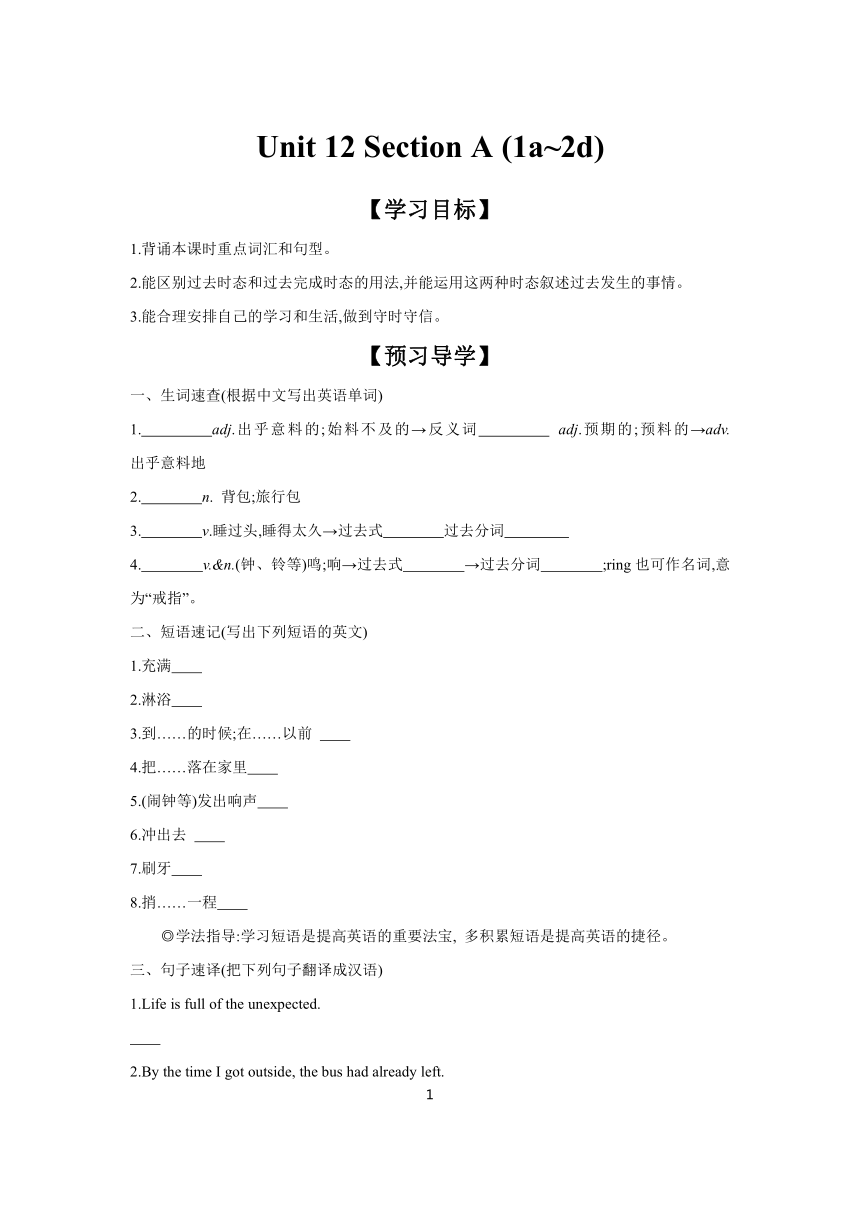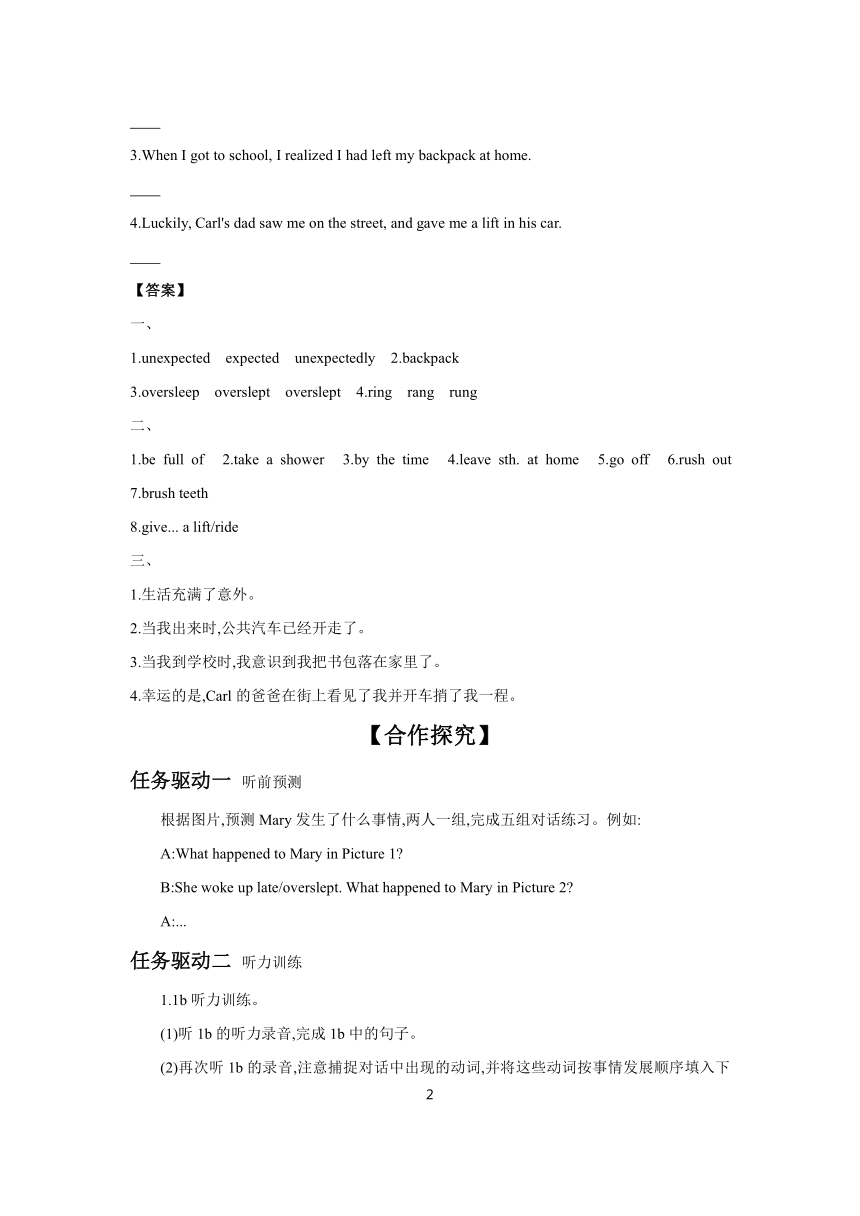Unit 12 Life is full of the unexpected Section A (1a-2d) 学案 2023-2024学年初中英语人教版九年级全一册(含答案)
文档属性
| 名称 | Unit 12 Life is full of the unexpected Section A (1a-2d) 学案 2023-2024学年初中英语人教版九年级全一册(含答案) |  | |
| 格式 | docx | ||
| 文件大小 | 28.2KB | ||
| 资源类型 | 教案 | ||
| 版本资源 | 人教新目标(Go for it)版 | ||
| 科目 | 英语 | ||
| 更新时间 | 2024-02-21 17:23:38 | ||
图片预览



文档简介
Unit 12 Section A (1a~2d)
【学习目标】
1.背诵本课时重点词汇和句型。
2.能区别过去时态和过去完成时态的用法,并能运用这两种时态叙述过去发生的事情。
3.能合理安排自己的学习和生活,做到守时守信。
【预习导学】
一、生词速查(根据中文写出英语单词)
1. adj.出乎意料的;始料不及的→反义词 adj.预期的;预料的→adv. 出乎意料地
2. n. 背包;旅行包
3. v.睡过头,睡得太久→过去式 过去分词
4. v.&n.(钟、铃等)鸣;响→过去式 →过去分词 ;ring也可作名词,意为“戒指”。
二、短语速记(写出下列短语的英文)
1.充满
2.淋浴
3.到……的时候;在……以前
4.把……落在家里
5.(闹钟等)发出响声
6.冲出去
7.刷牙
8.捎……一程
◎学法指导:学习短语是提高英语的重要法宝, 多积累短语是提高英语的捷径。
三、句子速译(把下列句子翻译成汉语)
1.Life is full of the unexpected.
2.By the time I got outside, the bus had already left.
3.When I got to school, I realized I had left my backpack at home.
4.Luckily, Carl's dad saw me on the street, and gave me a lift in his car.
【答案】
一、
1.unexpected expected unexpectedly 2.backpack
3.oversleep overslept overslept 4.ring rang rung
二、
1.be full of 2.take a shower 3.by the time 4.leave sth. at home 5.go off 6.rush out 7.brush teeth
8.give... a lift/ride
三、
1.生活充满了意外。
2.当我出来时,公共汽车已经开走了。
3.当我到学校时,我意识到我把书包落在家里了。
4.幸运的是,Carl的爸爸在街上看见了我并开车捎了我一程。
【合作探究】
任务驱动一 听前预测
根据图片,预测Mary发生了什么事情,两人一组,完成五组对话练习。例如:
A:What happened to Mary in Picture 1
B:She woke up late/overslept. What happened to Mary in Picture 2
A:...
任务驱动二 听力训练
1.1b听力训练。
(1)听1b的听力录音,完成1b中的句子。
(2)再次听1b的录音,注意捕捉对话中出现的动词,并将这些动词按事情发展顺序填入下面的横线上。
oversleptgot up; in the showergot out of; took and dressedwent outside; the bus had all the way got to school; realized; left
◎学法指导:根据1b中所听到的内容,把事情发展过程中出现的动词短语进行梳理并填写。
2.2a听力训练。
(1)听前热身。
(2)听录音,获取信息。
①听第一遍录音,完成2a中的图片排序。
②听第二遍录音,用所给动词的适当形式完成课本2b的题目。
◎学法指导:在听录音时,要学会获取关键信息,有倾向性地去听取问题的答案,并思考自己的听前预测能否得到印证。
任务驱动三 话题训练
轮流扮演Mary,根据1a中的图片提示,两人一组来讨论早晨发生的事情,形成对话。
A:What happened
B:I overslept. By the time I got up, my brother had already gotten in the shower.
A:...
任务驱动四 对话训练
1.朗读课本上2d对话,并回答下列问题。
①Why was Kevin late for class today
②When did Kevin wake up
③Did Kevin eat breakfast
④Did Kevin catch the bus
⑤How did Kevin get to school
2.根据2d的对话,完成下面的练习。全班核对答案。
Kevin was late for class today because his alarm clock didn't . He kept sleeping and he didn't until 8:00 a.m. He just quickly some clothes and the door without . He didn't even or wash his face. But before he the bus stop, the bus . Luckily, Carl's dad saw him and in the car. By the time he got to school, he was only five minutes late for class.
3.两人一组,表演2d的对话,评出最佳表演小组。
【答案】
任务驱动二
had gotten got left ran had
任务驱动四
1.①Because his alarm clock didn't go off and he overslept.
②He woke up at 8:00 a.m.
③No, he didn't. He didn't even brush his teeth or wash his face.
④No, he didn't.
⑤Carl's dad gave him a lift in his car.
2.go off wake up put on rushed out eating breakfast brush his teeth got to had already left gave him a lift
【知识超市】
[命题点一]
by the time... 引导的时间状语从句
◎用法总结:by the time...意为“到……时候(为止)”,是一个介词短语,在句中经常起连词作用,引导时间状语从句。如果从句中的谓语动词是一般过去时,那么主句中的谓语动词通常用过去完成时,表示“截止到从句动作发生时,主句动作已经完成,即过去的过去”。
对点自测
按要求完成下列句子
1.By the time he was 6, he (read) that book.(填空)
2. the time I got to the bus stop, the bus had already left.(填空)
3.当我走进教室时,老师已经开始讲课了。(翻译)
[命题点二]
leave sth.+ 地点“把某物遗忘在某处”。
◎用法总结:leave意为“遗留;落下;忘记带”,侧重把某物或某人留在某个地方,后常跟地点状语。forget侧重忘记某件事,后常跟to do sth.(忘了去做某事)或doing sth.(忘了做过某事)。
对点自测
按要求完成下列句子
1.Mike (leave) his money at home when he went shopping.(填空)
2.I (forget) to water the flowers yesterday.(填空)
3.当我到家时,我意识到我把钥匙忘在背包里。(翻译)
[命题点三]
Life is full of the unexpected. 生活充满了不可预料的事情。
◎用法总结:unexpected是形容词,意为“出乎意料的;始料不及的”,可用作定语或表语,其反义词为expected。
例如:The unexpected news knocked him back. 这个意外的消息使他大吃一惊。
It is quite different from the expected result. 它与预期的结果很不相同。
对点自测
用括号内所给单词的适当形式填空
Everyone thinks the new TV play's ending is (expected).
[命题点四]
My alarm clock didn't go off! 我的闹钟没有响!
◎用法总结:go off意为“(警报器等)突然发出巨响”。
例如:My alarm goes off at 6 a.m. 我的闹钟在早上六点闹。
【拓展】go off的其他含义:
1.(电灯)熄灭;(电)中断;停止运行
例如:Suddenly the lights went off. 灯突然熄灭了。
2.入睡;睡着
例如:Hasn't the baby gone off yet 孩子还没有睡着吗
3.离开(尤指做某事)
例如:She went off to get a drink. 她拿饮料去了。
对点自测
单项选择
( )My daughter got up and dressed herself quickly when her alarm clock .
A.ran off
B.went off
C.set off
D.turned off
[命题点五]
I kept sleeping, and when I woke up it was already 8:00 a.m.! 我一直在睡觉,当我醒来的时候已经是早上八点了!
◎用法总结:wake up意为“醒来;唤醒”,是“动词+副词”结构的短语。wake up接名词时,名词放在up前后皆可;接代词时,代词只能放在wake与up之间。
例如:Be quiet. Don't wake your father up. = Be quiet. Don't wake up your father. 安静点儿,别吵醒你爸爸。
Mom, please wake me up at five thirty. 妈妈,请在五点半叫醒我。
对点自测
单项选择
( )I was very tired and didn't until I heard the alarm clock.
A.show up B.wake up
C.stay up D.come up
【答案】
命题点一
对点自测
1.had read 2.By
3.By the time I walked into class, the teacher had started teaching already.
命题点二
对点自测
1.left
2.forgot
3.When I got home, I realized I had left my keys in the backpack.
命题点三
对点自测
unexpected
命题点四
对点自测
B
命题点五
对点自测
B
2
【学习目标】
1.背诵本课时重点词汇和句型。
2.能区别过去时态和过去完成时态的用法,并能运用这两种时态叙述过去发生的事情。
3.能合理安排自己的学习和生活,做到守时守信。
【预习导学】
一、生词速查(根据中文写出英语单词)
1. adj.出乎意料的;始料不及的→反义词 adj.预期的;预料的→adv. 出乎意料地
2. n. 背包;旅行包
3. v.睡过头,睡得太久→过去式 过去分词
4. v.&n.(钟、铃等)鸣;响→过去式 →过去分词 ;ring也可作名词,意为“戒指”。
二、短语速记(写出下列短语的英文)
1.充满
2.淋浴
3.到……的时候;在……以前
4.把……落在家里
5.(闹钟等)发出响声
6.冲出去
7.刷牙
8.捎……一程
◎学法指导:学习短语是提高英语的重要法宝, 多积累短语是提高英语的捷径。
三、句子速译(把下列句子翻译成汉语)
1.Life is full of the unexpected.
2.By the time I got outside, the bus had already left.
3.When I got to school, I realized I had left my backpack at home.
4.Luckily, Carl's dad saw me on the street, and gave me a lift in his car.
【答案】
一、
1.unexpected expected unexpectedly 2.backpack
3.oversleep overslept overslept 4.ring rang rung
二、
1.be full of 2.take a shower 3.by the time 4.leave sth. at home 5.go off 6.rush out 7.brush teeth
8.give... a lift/ride
三、
1.生活充满了意外。
2.当我出来时,公共汽车已经开走了。
3.当我到学校时,我意识到我把书包落在家里了。
4.幸运的是,Carl的爸爸在街上看见了我并开车捎了我一程。
【合作探究】
任务驱动一 听前预测
根据图片,预测Mary发生了什么事情,两人一组,完成五组对话练习。例如:
A:What happened to Mary in Picture 1
B:She woke up late/overslept. What happened to Mary in Picture 2
A:...
任务驱动二 听力训练
1.1b听力训练。
(1)听1b的听力录音,完成1b中的句子。
(2)再次听1b的录音,注意捕捉对话中出现的动词,并将这些动词按事情发展顺序填入下面的横线上。
oversleptgot up; in the showergot out of; took and dressedwent outside; the bus had all the way got to school; realized; left
◎学法指导:根据1b中所听到的内容,把事情发展过程中出现的动词短语进行梳理并填写。
2.2a听力训练。
(1)听前热身。
(2)听录音,获取信息。
①听第一遍录音,完成2a中的图片排序。
②听第二遍录音,用所给动词的适当形式完成课本2b的题目。
◎学法指导:在听录音时,要学会获取关键信息,有倾向性地去听取问题的答案,并思考自己的听前预测能否得到印证。
任务驱动三 话题训练
轮流扮演Mary,根据1a中的图片提示,两人一组来讨论早晨发生的事情,形成对话。
A:What happened
B:I overslept. By the time I got up, my brother had already gotten in the shower.
A:...
任务驱动四 对话训练
1.朗读课本上2d对话,并回答下列问题。
①Why was Kevin late for class today
②When did Kevin wake up
③Did Kevin eat breakfast
④Did Kevin catch the bus
⑤How did Kevin get to school
2.根据2d的对话,完成下面的练习。全班核对答案。
Kevin was late for class today because his alarm clock didn't . He kept sleeping and he didn't until 8:00 a.m. He just quickly some clothes and the door without . He didn't even or wash his face. But before he the bus stop, the bus . Luckily, Carl's dad saw him and in the car. By the time he got to school, he was only five minutes late for class.
3.两人一组,表演2d的对话,评出最佳表演小组。
【答案】
任务驱动二
had gotten got left ran had
任务驱动四
1.①Because his alarm clock didn't go off and he overslept.
②He woke up at 8:00 a.m.
③No, he didn't. He didn't even brush his teeth or wash his face.
④No, he didn't.
⑤Carl's dad gave him a lift in his car.
2.go off wake up put on rushed out eating breakfast brush his teeth got to had already left gave him a lift
【知识超市】
[命题点一]
by the time... 引导的时间状语从句
◎用法总结:by the time...意为“到……时候(为止)”,是一个介词短语,在句中经常起连词作用,引导时间状语从句。如果从句中的谓语动词是一般过去时,那么主句中的谓语动词通常用过去完成时,表示“截止到从句动作发生时,主句动作已经完成,即过去的过去”。
对点自测
按要求完成下列句子
1.By the time he was 6, he (read) that book.(填空)
2. the time I got to the bus stop, the bus had already left.(填空)
3.当我走进教室时,老师已经开始讲课了。(翻译)
[命题点二]
leave sth.+ 地点“把某物遗忘在某处”。
◎用法总结:leave意为“遗留;落下;忘记带”,侧重把某物或某人留在某个地方,后常跟地点状语。forget侧重忘记某件事,后常跟to do sth.(忘了去做某事)或doing sth.(忘了做过某事)。
对点自测
按要求完成下列句子
1.Mike (leave) his money at home when he went shopping.(填空)
2.I (forget) to water the flowers yesterday.(填空)
3.当我到家时,我意识到我把钥匙忘在背包里。(翻译)
[命题点三]
Life is full of the unexpected. 生活充满了不可预料的事情。
◎用法总结:unexpected是形容词,意为“出乎意料的;始料不及的”,可用作定语或表语,其反义词为expected。
例如:The unexpected news knocked him back. 这个意外的消息使他大吃一惊。
It is quite different from the expected result. 它与预期的结果很不相同。
对点自测
用括号内所给单词的适当形式填空
Everyone thinks the new TV play's ending is (expected).
[命题点四]
My alarm clock didn't go off! 我的闹钟没有响!
◎用法总结:go off意为“(警报器等)突然发出巨响”。
例如:My alarm goes off at 6 a.m. 我的闹钟在早上六点闹。
【拓展】go off的其他含义:
1.(电灯)熄灭;(电)中断;停止运行
例如:Suddenly the lights went off. 灯突然熄灭了。
2.入睡;睡着
例如:Hasn't the baby gone off yet 孩子还没有睡着吗
3.离开(尤指做某事)
例如:She went off to get a drink. 她拿饮料去了。
对点自测
单项选择
( )My daughter got up and dressed herself quickly when her alarm clock .
A.ran off
B.went off
C.set off
D.turned off
[命题点五]
I kept sleeping, and when I woke up it was already 8:00 a.m.! 我一直在睡觉,当我醒来的时候已经是早上八点了!
◎用法总结:wake up意为“醒来;唤醒”,是“动词+副词”结构的短语。wake up接名词时,名词放在up前后皆可;接代词时,代词只能放在wake与up之间。
例如:Be quiet. Don't wake your father up. = Be quiet. Don't wake up your father. 安静点儿,别吵醒你爸爸。
Mom, please wake me up at five thirty. 妈妈,请在五点半叫醒我。
对点自测
单项选择
( )I was very tired and didn't until I heard the alarm clock.
A.show up B.wake up
C.stay up D.come up
【答案】
命题点一
对点自测
1.had read 2.By
3.By the time I walked into class, the teacher had started teaching already.
命题点二
对点自测
1.left
2.forgot
3.When I got home, I realized I had left my keys in the backpack.
命题点三
对点自测
unexpected
命题点四
对点自测
B
命题点五
对点自测
B
2
同课章节目录
- Unit 1 How can we become good learners.
- Section A
- Section B
- Unit 2 I think that mooncakes are delicious!
- Section A
- Section B
- Unit 3 Could you please tell me where the restroom
- Section A
- Section B
- Unit 4 I used to be afraid of the dark.
- Section A
- Section B
- Unit 5 What are the shirts made of?
- Section A
- Section B
- Review of Units 1-5
- Unit 6 When was it invented?
- Section A
- Section B
- Unit 7 Teenagers should be allowed to choose their
- Section A
- Section B
- Unit 8 It must belong to Carla.
- Section A
- Section B
- Unit 9 I like music that I can dance to.
- Section A
- Section B
- Unit 10 You're supposed to shake hands.
- Section A
- Section B
- Review of Units 6-10
- Unit 11 Sad movies make me cry.
- Section A
- Section B
- Unit 12 Life is full of the unexpected
- Section A
- Section B
- Unit 13 We're trying to save the earth!
- Section A
- Section B
- Unit 14 I remember meeting all of you in Grade 7.
- Section A
- Section B
- Review of Units 11-14
